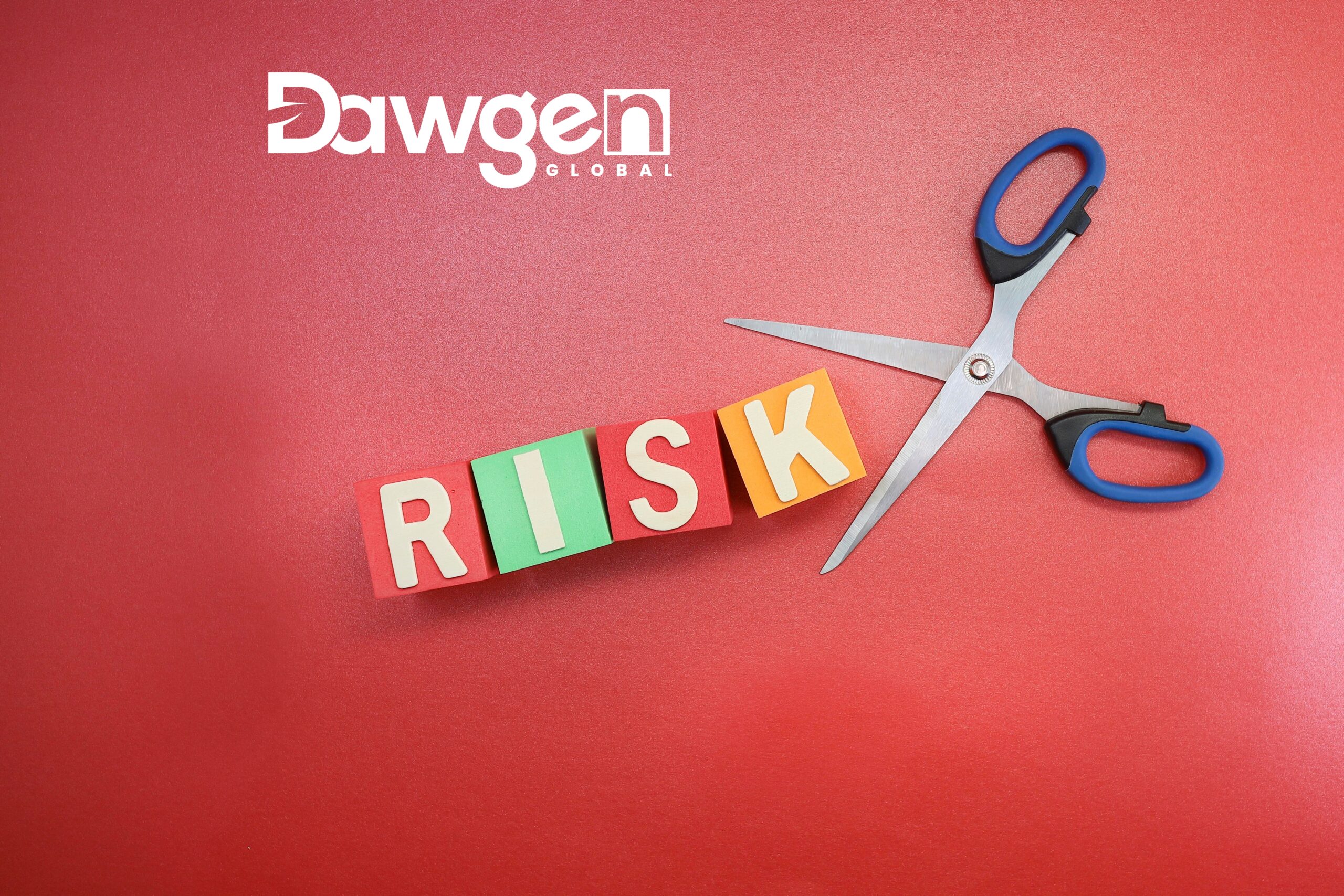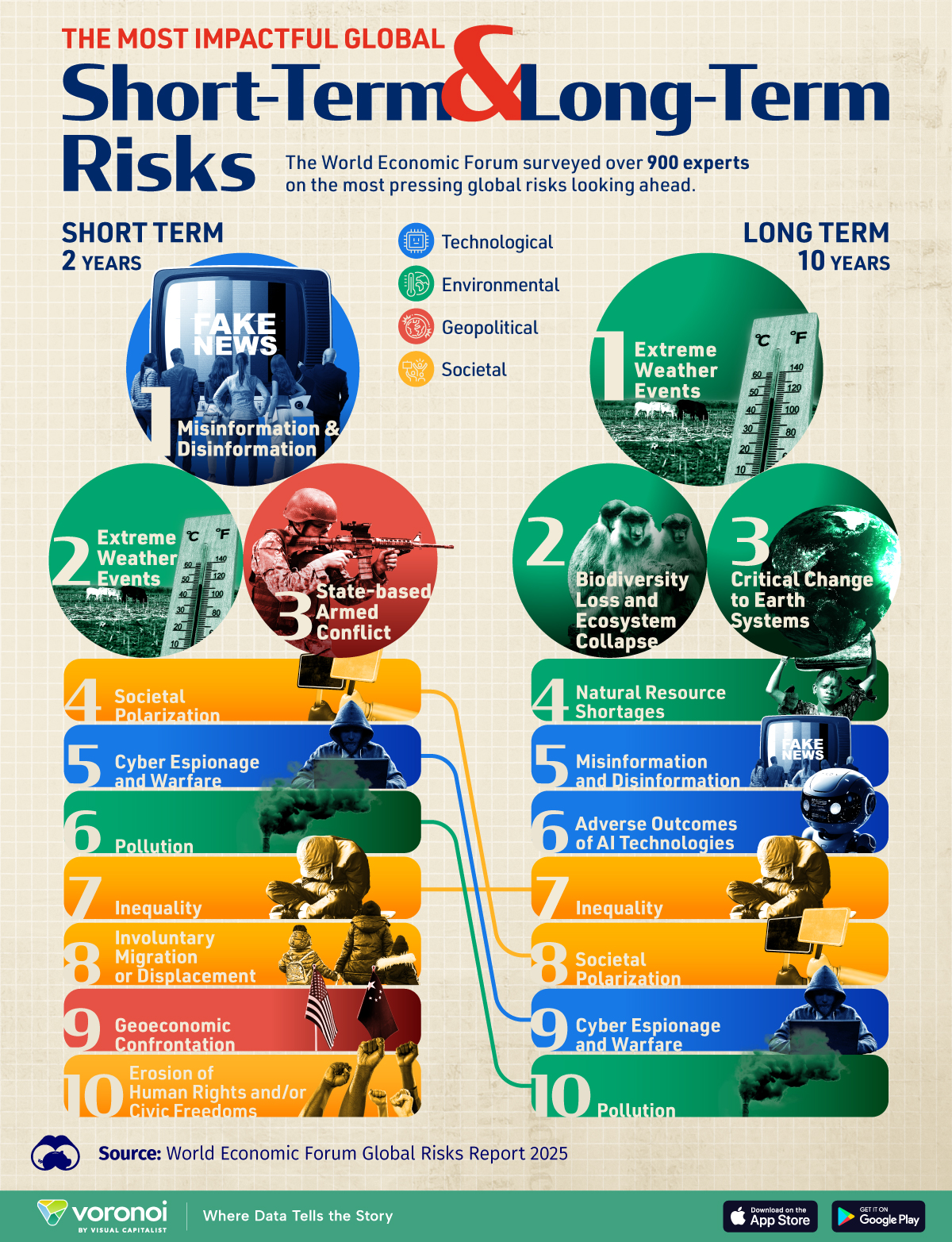 The global risk landscape is rapidly evolving, shaped by technological advancements, environmental hazards, and increasing geopolitical tensions. According to the World Economic Forum’s (WEF) Global Risks Report, which surveyed over 900 experts, the most pressing short-term and long-term risks facing the world highlight the need for immediate action and strategic planning by businesses, governments, and civil society.
The global risk landscape is rapidly evolving, shaped by technological advancements, environmental hazards, and increasing geopolitical tensions. According to the World Economic Forum’s (WEF) Global Risks Report, which surveyed over 900 experts, the most pressing short-term and long-term risks facing the world highlight the need for immediate action and strategic planning by businesses, governments, and civil society.

The Most Impactful Short-Term Risks (2025-2027)
Over the next two years, the world faces a heightened risk of technological, environmental, and geopolitical disruptions. The top 10 most impactful short-term risks are:
- Misinformation and Disinformation (Technological)
The rise of AI-driven content creation tools has led to an explosion of fake news and misleading content, undermining trust in institutions, fueling societal divisions, and influencing elections. - Extreme Weather Events (Environmental)
Climate change is increasing the frequency and severity of natural disasters, including wildfires, hurricanes, floods, and heatwaves, causing significant economic and social damage. - State-Based Armed Conflict (Geopolitical)
Geopolitical tensions, trade disputes, and military conflicts continue to escalate, leading to instability, economic disruptions, and humanitarian crises. - Societal Polarization (Societal)
Rising ideological and political divides are causing fragmentation within societies, increasing the risk of civil unrest and weakening governance structures. - Cyber Espionage and Warfare (Technological)
As digital transformation accelerates, cyber threats are becoming more sophisticated, targeting governments, corporations, and critical infrastructure. - Pollution (Environmental)
Industrial activities, deforestation, and plastic waste pollution continue to degrade air, water, and soil quality, posing a major threat to public health. - Inequality (Societal)
Economic disparities and social inequality are fueling unrest and impeding global development, particularly in emerging economies. - Involuntary Migration or Displacement (Societal)
Conflicts, climate change, and economic instability are driving forced migration, straining resources in host countries. - Geoeconomic Confrontation (Geopolitical)
Trade wars, sanctions, and economic policies driven by national interests threaten global economic cooperation and financial stability. - Erosion of Human Rights and Civic Freedoms (Societal)
Increasing government surveillance, censorship, and restrictions on freedoms pose significant challenges to democracy and human rights worldwide.
The Most Impactful Long-Term Risks (2025-2035)
Looking ahead to the next decade, environmental risks emerge as the most dominant challenges, reflecting the long-term impact of climate change and ecosystem degradation. The top 10 long-term risks are:
- Extreme Weather Events (Environmental)
Climate change continues to intensify, leading to more frequent and devastating natural disasters. - Biodiversity Loss and Ecosystem Collapse (Environmental)
The destruction of natural habitats and declining biodiversity threaten food security, water supply, and public health. - Critical Change to Earth Systems (Environmental)
Rising sea levels, desertification, and changing ocean currents pose existential risks to coastal and low-lying communities. - Natural Resource Shortages (Environmental)
Water scarcity, food shortages, and depletion of essential minerals could trigger economic crises and geopolitical conflicts. - Misinformation and Disinformation (Technological)
The long-term effects of misinformation continue to erode trust in institutions and democratic processes. - Adverse Outcomes of AI Technologies (Technological)
AI’s potential misuse in decision-making, bias in algorithms, and lack of regulatory oversight present significant ethical and economic risks. - Inequality (Societal)
Economic and social disparities remain a long-term concern, exacerbated by automation and shifts in labor markets. - Societal Polarization (Societal)
Political divisions and ideological conflicts continue to threaten social cohesion and global cooperation. - Cyber Espionage and Warfare (Technological)
The increasing sophistication of cyber-attacks presents risks to national security and economic stability. - Pollution (Environmental)
The long-term effects of industrial waste, plastic pollution, and greenhouse gas emissions continue to degrade the planet.
Strategic Responses to Global Risks
To mitigate these risks, businesses, governments, and global organizations must adopt forward-thinking strategies:
- Strengthening Digital Literacy & Cybersecurity: Investing in digital literacy programs and cybersecurity infrastructure is crucial to counter misinformation, prevent data breaches, and enhance digital resilience. Governments and corporations should work together to establish cybersecurity protocols, train individuals on identifying misinformation, and ensure AI-generated content is regulated.
- Enhancing Climate Resilience: Climate adaptation strategies, including the expansion of renewable energy sources, implementation of carbon reduction policies, and investment in climate-resistant infrastructure, must be prioritized. Governments should incentivize businesses to adopt eco-friendly practices, and global cooperation on climate action should be reinforced through binding international agreements.
- Advancing Economic Inclusion: Addressing economic disparities requires sustainable policies that promote fair wages, universal access to healthcare and education, and financial inclusion programs. Public-private partnerships can drive social mobility by creating job opportunities, supporting small businesses, and ensuring equal access to technological advancements.
- Fostering Global Cooperation: As geopolitical tensions rise, stronger diplomatic engagement and international collaboration will be essential to prevent conflicts and economic disruptions. Institutions like the United Nations and the World Trade Organization must lead efforts in conflict resolution, trade negotiations, and crisis management to ensure a stable global economy.
- Regulating AI Development: With the rapid adoption of AI, clear ethical guidelines and regulatory frameworks must be established to prevent misuse and protect human rights. Governments and AI developers should prioritize transparency in AI decision-making, eliminate algorithmic biases, and ensure AI complements human work rather than replacing it in ways that exacerbate unemployment.
Conclusion
As we move into 2025 and beyond, navigating the complexities of global risks requires a proactive approach. From technological disruptions to environmental crises, businesses and policymakers must collaborate to build a resilient future. By understanding these emerging risks and implementing strategic interventions, we can mitigate their impact and shape a more secure and sustainable world. The decisions we make today will determine the stability and prosperity of future generations, making risk mitigation an urgent priority.
Next Step!
“Embrace BIG FIRM capabilities without the big firm price at Dawgen Global, your committed partner in carving a pathway to continual progress in the vibrant Caribbean region. Our integrated, multidisciplinary approach is finely tuned to address the unique intricacies and lucrative prospects that the region has to offer. Offering a rich array of services, including audit, accounting, tax, IT, HR, risk management, and more, we facilitate smarter and more effective decisions that set the stage for unprecedented triumphs. Let’s collaborate and craft a future where every decision is a steppingstone to greater success. Reach out to explore a partnership that promises not just growth but a future beaming with opportunities and achievements.





Join hands with Dawgen Global. Together, let’s venture into a future brimming with opportunities and achievements

